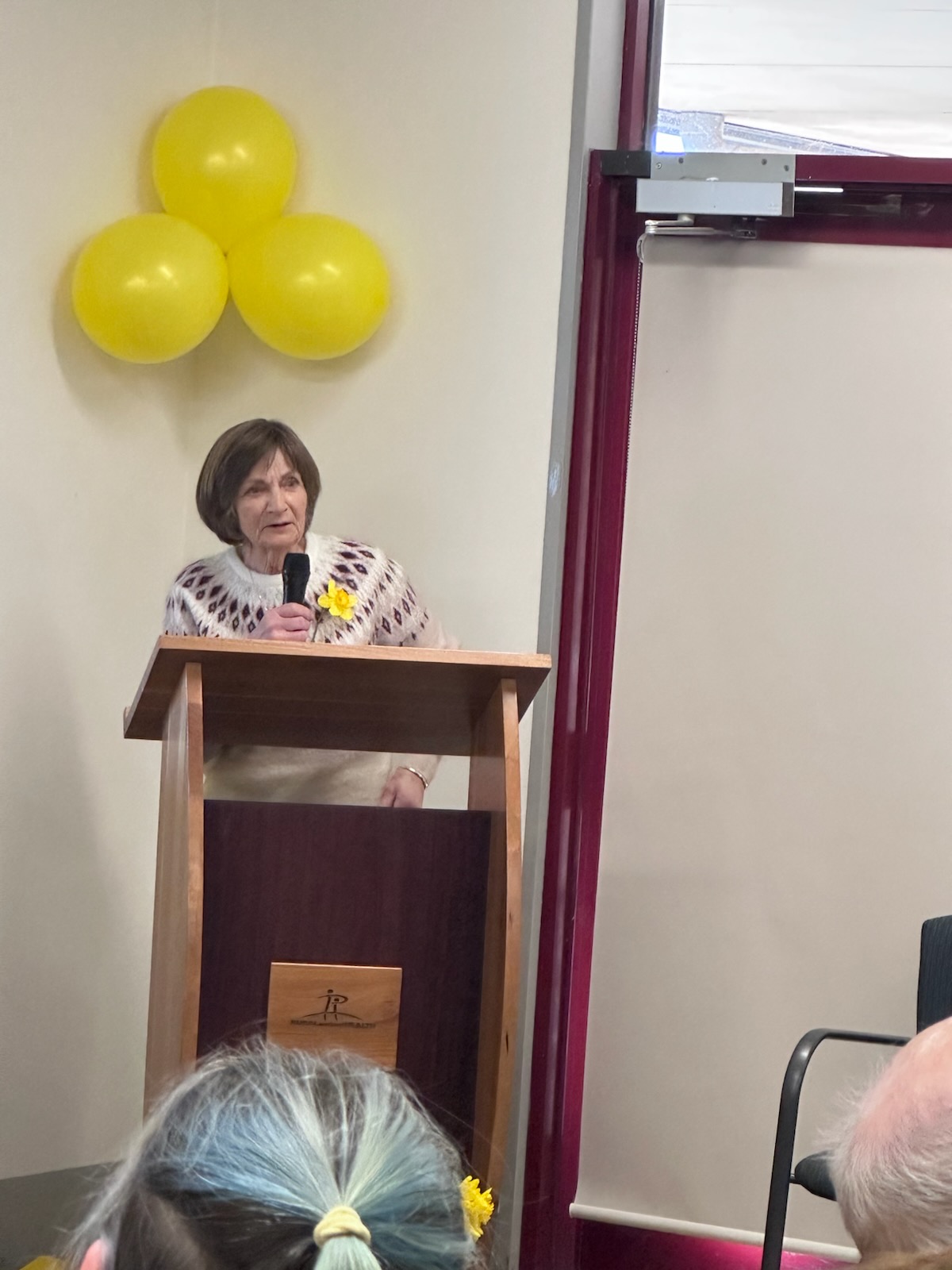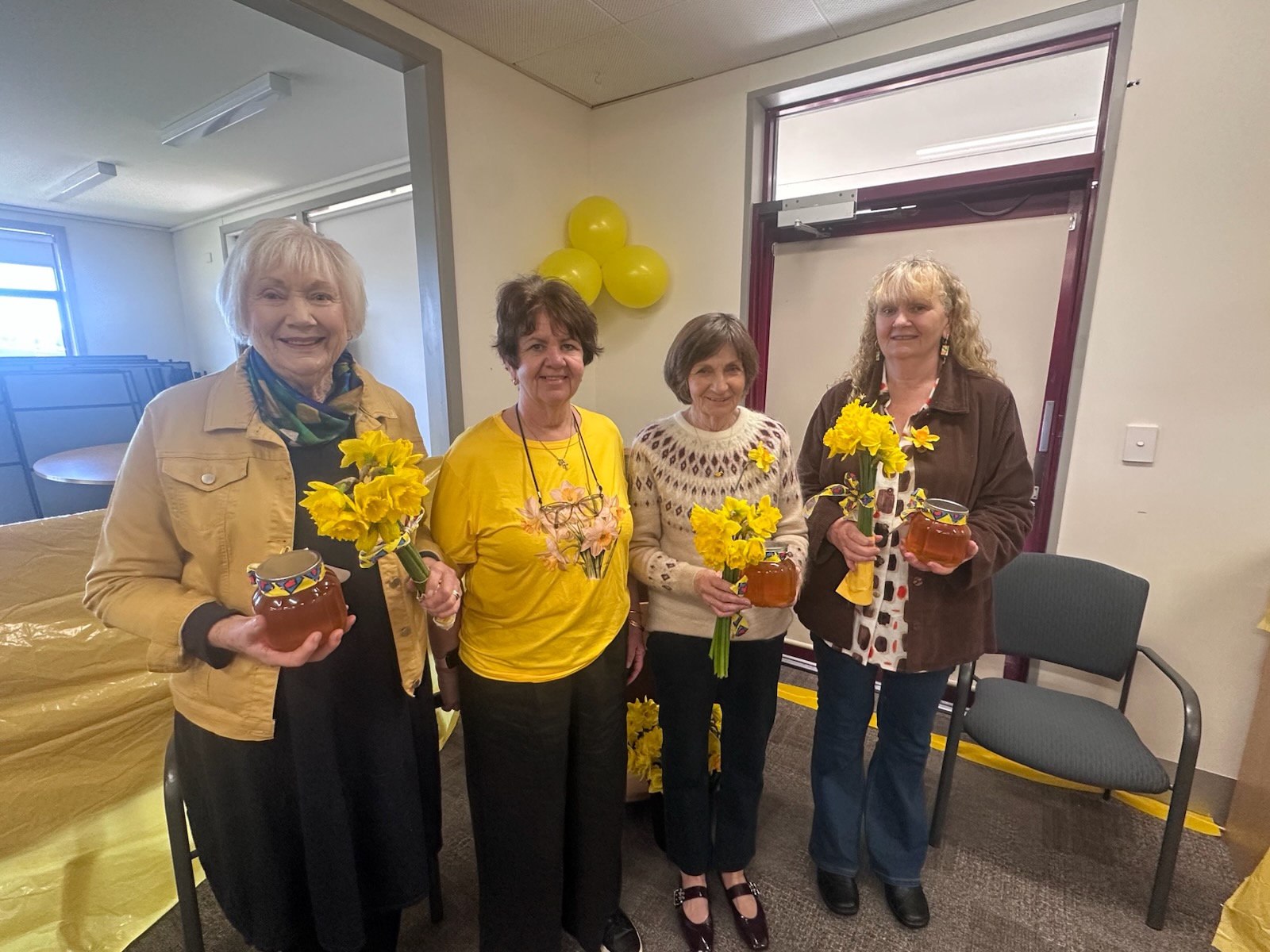… was the advice three cancer survivors shared during the Daffodil Day morning tea at the Warracknabeal Campus today.
Hosted by Cancer Resource Nurse Karen Miller, the morning tea brought together around 60 guests including members of the Warracknabeal Cancer Support Group, their families and friends, and the community.
Welcoming all to the event, Karen said days like today are a truly special time to come together and not only remember those we’ve lost to cancer, but also those who continue their journey.
Decorating the Warracknabeal Education Room in a sea of yellow including bunches of daffodils, Karen said the daffodil is a symbol of hope, resilience, and the promise of a better future.
Enjoying a beautiful morning tea, including some yellow-themed cupcakes from Woodbine, guests were then captivated by the stories of the three guest speakers, all of whom are Warracknabeal Cancer Support Group members.
First up was Leonie Saunders who shared her experience with melanoma.
From noticing a mole on her neck to having it removed, Leonie shared how she went to visit her doctor a few days later and thought she was just having the stitches removed.
“Instead, he told me I had a melanoma,” she said.
“I was in a daze and thought ‘this can’t be happening to me’.”
“Although I’m sun smart now, I wasn’t back in the 70s when I spent hours sunbaking, but the dangers just weren’t talked about back then.”
Leonie also shared how, just 12 months later, she felt a lump under her jaw which rapidly ended up with her in Ballarat for surgery to remove 30-40 lymph nodes and undergoing immunotherapy.
Fortunately, Leonie’s treatment was successful, and she has no current signs of cancer.
However, she urges everyone to visit their doctor if they feel something unusual – ” even if you think it’s nothing, just go because you never know,” she said.
Following Leonie, Mary Massey shared her experience in not only surviving breast cancer 30 years ago, but also in surviving bowel cancer which led to a stoma.
“I remember I was playing in a golf championship, and we were at the first hole when I got a call from my GP,” Mary said.
“I had undergone a colonoscopy after noticing blood appearing when using the bathroom and was stunned when my GP told me I had cancer,” she said.
“I wondered ‘what now?’ and walked off the course to go home.”
“Heading straight into surgery to have a stoma installed (a surgically created opening in the body, typically in the abdomen, that allows waste to be diverted out of the body and collected in a pouch), I woke up feeling not too bad, but it’s hard to describe the feeling of knowing that you can never recover from it.”
“I hold a grudge against my stoma but have had to learn to live with it. I change the pouch 1-2 times daily and had to make some minor dietary changes – I can’t eat corn, Cos lettuce or cream now and I stick to a fairly basic diet of chicken or red meat and vegetables,” she said.
“But I’m still here! – I won’t let it hold me back and still enjoy my life and my golf.”
And the third, and final speaker, was Judy Drage who also survived breast cancer 12 years ago, and who is now battling blood cancer.
“It was odd because when I had breast cancer, people said ‘well if you have to have cancer, breast cancer is a good one to have’. To that I say rubbish, but it does at least usually have a start, treatment, and end,” Judy said.
“Now, it’s an unusual situation because the blood cancer kind of crept up on me and there is no cure or treatment. It’s just about maintenance,” she said.
Judy shared how she didn’t know anything was wrong but, as someone who has had “hundreds” of blood tests in her life, considers herself something of an expert and that during a follow up appointment with her oncologist dealing with the breast cancer, a blood test showed her red blood cells had dropped under 100, then as low as 80, and even 55 – the usual level should be around 120.
“This also meant that my white blood cells were in the hundreds when they should only be in single digits,” she said.
“The test discovered three different types of blood cancer.”
“Now, I have to have a blood transfusion every three weeks, and I also get very tired as there’s not enough oxygen being pumped around my system.”
“Unfortunately, it also means I can’t travel much as I pick up infections very easily. But it’s about making every moment count, and I will often pretend I’m travelling when I go to Ballarat for my transfusions and will go out for a nice dinner as a special treat.”
Shocking the crowd when she shared that a one-month dose of her medication costs $4,912, Judy acknowledged the Pharmaceutical Benefits Scheme (PBS) which means she, fortunately, does not have to pay this.
“However, my oncologist had to get permission from Canberra to prescribe the medication,” she said.
Also encouraging attendees to be positive and to surround themselves with supportive and loving family and friends, Judy said she “has had a wonderful life” and that it’s about being thankful for what you have done.
With each speaker praising the support group as being a place where they’ve made new friends, and can share their experiences, the event also saw guests invited to guess the number of daffodils in an image, and to purchase bunches of fresh daffodils.
All proceeds raised from the morning tea will be donated to the Cancer Council with a final figure to be announced once tallied.




